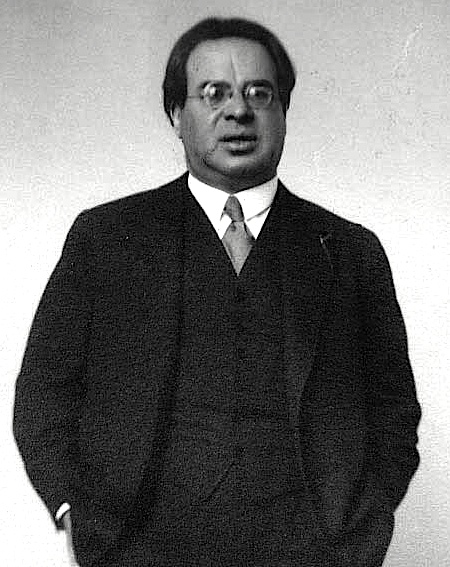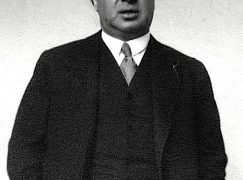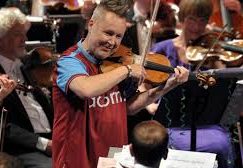Berlin finally remembers its greatest music influence
mainThe city is to erect a memorial plaque to Leo Kestenberg, head of music from 1920 to 1933 at the Prussian ministry of culture, where he not only rewrote the school curriculum for the entire country but completely reorganised the city’s theatres, concert halls and conservatoria.
Kestenberg engaged his own teacher, Ferruccio Busoni, as professor of composition, followed by Arnold Schoenberg. He called in Otto Klemperer and Alexander Zemlinsky to create the Kroll Theatre and generally did more than anyone in the Weimar years to make Berlin a hub of modernism. Parts of his curriculum are still used today, from infants school to university.
When Hitler seized power, Kestenberg migrated to Tel Aviv, where he organised the future Israel Philharmonic Orchestra and taught such promising students as Menahem Pressler and Alexis Weissenberg.
It’s about time Berlin remembered him.







This wonderful city, my city, that presents itself to the world as a hub of creativity, is in reality one of the most culturally conservative and establishment controlled places on earth.
So here, if you want a shrine consecrated in your name, better that that is Karajan or dare I say, Boulez.
Naming a state-funded academy after Boulez is quite an insult to music lovers, and to musicians.
That’s OK Leo, the vast majority of Berliners have no idea who he was.
How lucky for them. They just went up in my admiration; he wanted to burn down their concert halls (that had already been done before).
Still, once they dig up, they won’t like what they find. This will be a monument for a political establishment as foul as its artistic products.
Your statement is somewhat misleading on two fronts: the academy is named after Said, not after Boulez – he is the namesake of the hall within the academy. Secondly, while you are right that there is some government money going to the Said Academy it is a private institution and not state-run. Apart from that, I find it almost laughable that in this thread first Berlin is called culturally reactionary and then naming something after Boulez is given as proof of that! You may or may not rate Boulez as a composer, but reactionary is certainly the last thing on earth one could describe him as having been.
You are right, it is the Said Academy, thank you.
Regarding “reactionary” – this is a term originally used by both communists AND nazis to label “enemies of the revolution”, whatever revolution it may be.
traditionally, it would mean those who would oppose a revolution and prefer a previous state of affairs.
If one acknowledges that the current state of affairs in classical music is miserable, and that a previous situation was better – what’s wrong being ‘reactionary’?
Suzanne I have no problem personally with his music but utterly and totally disagree with your characterisation of Boulez as a revolutionary. As chief of the ‘avant-garde secret police’, he for the most of his career defined all that is wrong with top down creative control.
He was the idealogical leader of a movement that did untold and unnecessary harm to this art-form, not through their own work but through their relentless suppression of the work of those who happened not to share their ideas.
Trust me, it may have taken the best part of 70 years but many in this country are waking up now to this reality. Berlin however, establishment heartland that it is, is moving a little more slowly. But why not keep that name on this venue? It might just serve as a warning to future generations.
There is a difference between actually being a revolutionary, an iconoclast, and cultivating the appearance that you are one. True revolutionaries don’t fear those who disagree with them.
“Secondly, while you are right that there is some government money going to the Said Academy it is a private institution and not state-run.”
Where do you think the line has to be drawn, if the majority of an institution’s funding is by the government? Can it really still be called private?
And Boulez and not being a reactionary? Well, at least he was a major hypocrite. Salon revolutionary. Raking in money and living most comfortably from the support of the upper class while denouncing their cultural forms and tastes. Makes him so irrelevant.
Karajan the nazi
There is also a Musikschule (one of the largest in the city) named after Herr Kestenberg. The plaque is deserved but it is not the city’s first or only acknowledgment of the man.
https://youtu.be/9msA_DLi3_A
Good to know.
I thought that Kerstenberg also asked Franz Schreker to be head of the music academy in 1920. Schreker still has the misfortune that he is being overlooked, while he was one of the great composers of the interbellum, friend of Schönberg, teacher of almost all young composers in the twenties, before being pulverized by nazis and pre-modernism.
You’re very right about Schreker. Of course we also often associate this very creative period in the city’s history with Weill and perhaps Eisler who has a Hochschule named in his honour.
I’m ashamed to say I’d not heard much of Schreker until the last couple of years. An exceptional talent and gift and someone who deserves much more air time and exposure. Can’t get enough of his music now and he’s been the impetus to explore the others in that circle, Schmidt,Burger,Braunfels and more.
There is a wonderful biography by Christopher Hailey:
http://www.amazon.com/Franz-Schreker-1878-1934-Biography-Twentieth/dp/0521392551
It is more than a biography, it is also a fascinating analysis of music history in Germany 1900 – 1935, from which it appears that in the twenties, there was a very broad range of musical idioms and ideas about ‘new music’, and not at all the straight line narrative of postwar modernist propaganda who claimed only the ‘line’ from Wagner’s Tristan, Mahler’s late works, towards Schoenberg, Berg and Webern, right into postwar serialism. The early twenties were an incredible boiling pot of ideas, cut short by the first stirrings of streamlined modernism and populist entertainment, and later-on by fascism.
Dear David R Osborne,
I didn’t in fact characterise Boulez as a revolutionary, but yes, you and I probably disagree on whether to lump Boulez with the establishment or the anti-establishment crowd.
Dear Suzanne, I’m speaking from the assumption that revolutionary and reactionary are dictionary opposites.
You would not be the first on this site to have difficulty with the concept that the avant-garde has been the establishment for at least two generations.
For anybody who has not as yet noticed:
http://subterraneanreview.blogspot.nl/2016/01/notes-on-boulez.html
The blog might be a bit unclear. The Palestine Orchestra was founded by Bronisław Huberman in 1936. The first concert was conducted by Toscanini, an adamant anti-Fascist. Kestenberg was the general manager of the orchestra from 1938 to 1945 when it was still named the Palestine Orchestra. After the creation of Israel in 1948, it was renamed the Israel Philharmonic.
Anon,
would you mind sharing with us WHO sponsored Mr Boulez? Which members of the upper classes (not considering state institutions) decided his activity was worth their dime?
As far as I know, he himself hailed from a not-so-poor family, albeit episodes of relative poverty while in Paris.
PB was supported, in the beginning, by private patronage and later-on got hold of government subsidies, all in the name of musical progress, during the Pompidou era (seventies) – leftish ‘idealism’ to also get the arts kicked into the eternal future. PB got his generously-paid utopian cellar under the Centre Pompidou, this embarrassing eye sore in the middle of the poetic Parisian city scape.
“According to Joan Peyser’s biography of Boulez, the literary socialite Suzanne Tézenas, companion of the ardent fascist Pierre Drieu La Rochelle (who committed suicide shortly before the end of the war), was an early admirer and supporter [sic] of this upcoming modernist composer, greeting him as her new artist savior.”
“In its early years, the ‘Institut de Recherche et Coordination Acoustique / Musique’ (IRCAM), together with its in-house Ensemble Intercontemporain – according to Alex Ross in his ‘The Rest is Noise’ – consumed up to 70 percent of the French budget for contemporary music.”
Source: John Borstlap, ‘The Classical Revolution’, 2nd edition by Dover New York, 2017, p. 35 & 63.